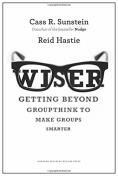BKMT READING GUIDES
Wiser: Getting Beyond Groupthink to Make Groups Smarter
by Cass R. Sunstein, Reid Hastie
Published: 2014-12-23
Hardcover : 272 pages
Hardcover : 272 pages
0 members reading this now
0 club reading this now
0 members have read this book
0 club reading this now
0 members have read this book
Why are group decisions so hard?
Since the beginning of human history, people have made decisions in groups?first in families and villages, and now as part of companies, governments, school boards, religious organizations, or any one of countless other groups. And having more than one ...
Since the beginning of human history, people have made decisions in groups?first in families and villages, and now as part of companies, governments, school boards, religious organizations, or any one of countless other groups. And having more than one ...
No other editions available.
Jump to
Introduction
Why are group decisions so hard?
Since the beginning of human history, people have made decisions in groups?first in families and villages, and now as part of companies, governments, school boards, religious organizations, or any one of countless other groups. And having more than one person to help decide is good because the group benefits from the collective knowledge of all of its members, and this results in better decisions. Right?
Back to reality. We’ve all been involved in group decisions?and they’re hard. And they often turn out badly. Why? Many blame bad decisions on ?groupthink” without a clear idea of what that term really means.
Now, Nudge coauthor Cass Sunstein and leading decision-making scholar Reid Hastie shed light on the specifics of why and how group decisions go wrong?and offer tactics and lessons to help leaders avoid the pitfalls and reach better outcomes. In the first part of the book, they explain in clear and fascinating detail the distinct problems groups run into:
? They often amplify, rather than correct, individual errors in judgment
? They fall victim to cascade effects, as members follow what others say or do
? They become polarized, adopting more extreme positions than the ones they began with
? They emphasize what everybody knows instead of focusing on critical information that only a few people know
In the second part of the book, the authors turn to straightforward methods and advice for making groups smarter. These approaches include silencing the leader so that the views of other group members can surface, rethinking rewards and incentives to encourage people to reveal their own knowledge, thoughtfully assigning roles that are aligned with people’s unique strengths, and more.
With examples from a broad range of organizations?from Google to the CIA?and written in an engaging and witty style, Wiser will not only enlighten you; it will help your team and your organization make better decisions?decisions that lead to greater success.
Since the beginning of human history, people have made decisions in groups?first in families and villages, and now as part of companies, governments, school boards, religious organizations, or any one of countless other groups. And having more than one person to help decide is good because the group benefits from the collective knowledge of all of its members, and this results in better decisions. Right?
Back to reality. We’ve all been involved in group decisions?and they’re hard. And they often turn out badly. Why? Many blame bad decisions on ?groupthink” without a clear idea of what that term really means.
Now, Nudge coauthor Cass Sunstein and leading decision-making scholar Reid Hastie shed light on the specifics of why and how group decisions go wrong?and offer tactics and lessons to help leaders avoid the pitfalls and reach better outcomes. In the first part of the book, they explain in clear and fascinating detail the distinct problems groups run into:
? They often amplify, rather than correct, individual errors in judgment
? They fall victim to cascade effects, as members follow what others say or do
? They become polarized, adopting more extreme positions than the ones they began with
? They emphasize what everybody knows instead of focusing on critical information that only a few people know
In the second part of the book, the authors turn to straightforward methods and advice for making groups smarter. These approaches include silencing the leader so that the views of other group members can surface, rethinking rewards and incentives to encourage people to reveal their own knowledge, thoughtfully assigning roles that are aligned with people’s unique strengths, and more.
With examples from a broad range of organizations?from Google to the CIA?and written in an engaging and witty style, Wiser will not only enlighten you; it will help your team and your organization make better decisions?decisions that lead to greater success.
Discussion Questions
No discussion questions at this time.Book Club Recommendations
Recommended to book clubs by 0 of 0 members.
MEMBER LOGIN
BECOME A MEMBER it's free
Book Club HQ to over 88,000+ book clubs and ready to welcome yours.
SEARCH OUR READING GUIDES
Search
FEATURED EVENTS
PAST AUTHOR CHATS
JOIN OUR MAILING LIST
Get free weekly updates on top club picks, book giveaways, author events and more
Get free weekly updates on top club picks, book giveaways, author events and more
Please wait...








